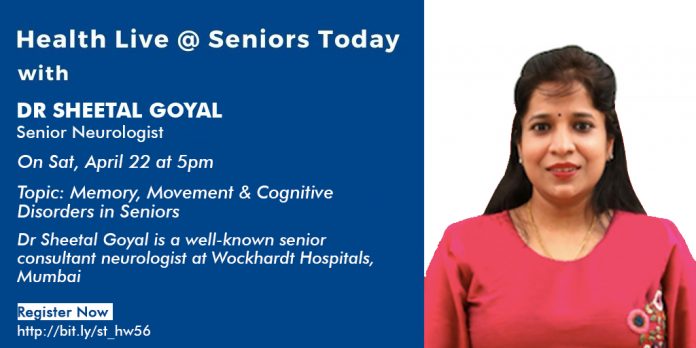On 22 Apr, 2023, Seniors Today hosted their weekly Health Live webinar with Dr Sheetal Goyal, a Senior Neurologist who spoke on and answered questions about Memory, Movement & Cognitive Disorders in Elders.
About Dr Sheetal Goyal:
Dr Sheetal Goyal is a well-known senior consultant neurologist in Mumbai. She has done her MBBS and MD Internal Medicine from Guwahati Medical College, Guwahati Assam, and DM Neurology and PDF in Cognitive Neurosciences from NIMHANS Bangalore. She has to her credit both National and International publications. She has also obtained separate training in the treatment of various memory and movement disorders, skills of Inj Botulinum Toxins and Deep Brain Stimulation.
She has done many certification courses of which prestigious ones are VEEG Certification by the Indian Epilepsy Society and a one-year learning course by ‘World Headache Society’. She is also trained in Botox injection given for writer cramps, cervical dystonia blepharospasm, etc. She is an ex-consultant Neurologist in Nemcare Super speciality Hospital, Guwahati and Apollo Clinic Ulubari, Guwahati. Dr Goyal is currently working at Wockhardt Hospitals, Mumbai Central, Mumbai.
Common symptoms observed in patients with memory disorders/ disturbances include:
- Difficulty in recollecting recent conversations- as observed by family members
- Difficulty in recollecting names of family members
- Difficulty in recollecting their meals they consumed during the day
- Misplacing their spectacles, phones, keys, etc. on a regular basis
Some activities and exercises you can engage in, to prevent memory disturbances in the later stages of life
- Physical exercise- this helps in the circulation of the blood and also helps in enhancing the learning capacity of the individual.
- Yoga- some asanas that can help in preventing memory loss/ disturbances include- padmasana– sitting in this pose is known to enhance the cognitive and memory abilities of the individual. Paschimottanasana pose- this increases the circulation of blood to the brain, thus enhancing the memory. Halasana pose, sirsasana
- Mental activities- these need activities out of your routine, daily lives. These activities include playing new games/ solving picture puzzles/ sudoku/ crossword puzzles, etc.
- Mindful walking
- Pick up new hobbies/ activities/ soft sports. Learn a new skill
- Hand- eye coordination activities and exercises
- Dance to the music of your choice
- Have an active social life by positively contributing to the society in addition to catching up with your near and dear ones
- Stay organised
- Sleep well- as we progress in age, lack of sleep can drastically affect our cognitive activities
Indulging in physical activity and yoga also helps by releasing chemicals in your brain which are positive chemicals which enhance memory to a large extent- some of them are dopamine, serotonin, epinephrine, endorphin.
If you have the habit of smoking under stressful situations, you can replace this habit by running when you’re under a stressful situation.
Food items that are known to enhance your memory
- Avocado
- Beetroot
- Turmeric
- Almonds
- Walnuts
- Green leafy vegetables
- Coffee, in limited quantities is known to boost your serotonin levels and uplift your mood and prevent cognitive disorders
- Rosemary
If you have comorbidities such as diabetes, hypertension, thyroid disorders- ensure that you are compliant with your medications. Patients with controlled hypertension and diabetes are at a lower risk of memory and cognitive disorders.
Raga therapy is an area of interest and extensive research for Dr Goyal. And she says that her patents have been largely benefited by it.
Ensure that you have a regular daily routine. And include a new activity in it as well.
Certain drugs can also cause memory issues. You need to seek advise from your physician and ask for an alternative if possible.
One of the most common movement disorders in the elderly is fall. Others include tingling sensation in the hands/ legs, tremors, abnormal paresthesia, etc.
Fall in the older age can occur due to multiple reasons such as osteoarthritis, balance issues, weak eyesight, tremors, chronic illnesses, improper diet, etc.
Preventative measures for fall:
- Maintain your joint health. Physiotherapy when recommended should be taken seriously and followed through
- Manage vascular and neurological disorders which are a result of uncontrolled diabetes/ hypertension
- Avoid tobacco and alcohol
- Avoid multitasking
- Never get up from your lying position immediately and suddenly
Shakiness/ tremors can be a cause for concern when it starts to interfere with your daily activities such as holding an object/ grass without spilling. This can be drug induced or in addition to another disorder.
Slow walking, tremors, expressionless face, etc. can be symptoms of Parkinsonism and should be taken seriously and you should consult a neurologist when in doubt.
Family support plays a major role in memory and movement disorders.
Hearing difficulties also accelerate memory disorders, not directly but by virtue of social isolation.
Meditation is also an activity that helps with memory and movement disorders by reducing stress, controlling your breathing and circulation of blood.
If memory loss is secondary to depression, in such cases antidepressants will help in memory loss. If not, it will worsen the loss of memory.
There is a difference between memory and inattention. Avoid mentally multitasking. This will help with inattention.








